Vocational Trucks Market
Vocational Trucks Market Size and Share Forecast Outlook 2025 to 2035
Vocational trucks market is projected to grow from USD 94.0 billion in 2025 to USD 126.0 billion by 2035, at a CAGR of 3.0%. Concrete/Mixer & Tipper Trucks will dominate with a 38.0% market share, while class 6-8 vocational will lead the gvw segment with a 62.0% share.
Vocational Trucks Market Forecast and Outlook 2025 to 2035
The global vocational trucks market is valued at USD 94.0 billion in 2025. It is slated to reach USD 126.0 billion by 2035, recording an absolute increase of USD 32.0 billion over the forecast period. This translates into a total growth of 34.0%, with the market forecast to expand at a compound annual growth rate (CAGR) of 3.0% between 2025 and 2035.
The overall market size is expected to grow by nearly 1.3X during the same period, supported by increasing infrastructure development, growing demand for specialized commercial vehicles, and rising emphasis on construction and utility applications across diverse transportation sectors, fleet operations, and commercial vehicle services.
Quick Stats for Vocational Trucks Market
- Vocational Trucks Market Value (2025): USD 94.0 billion
- Vocational Trucks Market Forecast Value (2035): USD 126.0 billion
- Vocational Trucks Market Forecast CAGR: 3.0%
- Leading Type in Vocational Trucks Market: Concrete/Mixer & Tipper Trucks
- Key Growth Regions in Vocational Trucks Market: North America, Europe, and Asia Pacific
- Key Players in Vocational Trucks Market: Daimler Trucks, Volvo Trucks, Paccar, Isuzu, Hino, Navistar
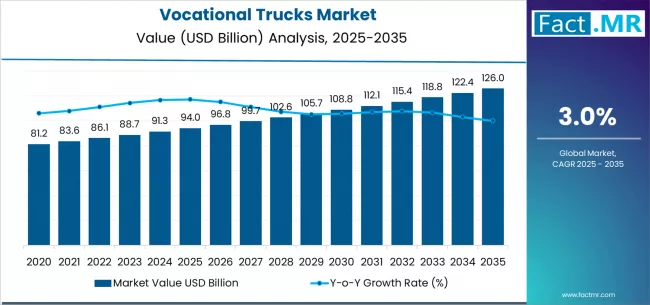
Between 2025 and 2030, the vocational trucks market is projected to expand from USD 94.0 billion to USD 109.0 billion, resulting in a value increase of USD 15.0 billion, which represents 46.9% of the total forecast growth for the decade. This phase of development will be shaped by increasing construction activities, rising infrastructure investments, and growing demand for specialized transportation solutions across construction projects, utility services, and commercial transportation applications.
Vocational Trucks Market Key Takeaways
| Metric | Value |
|---|---|
| Estimated Value in (2025E) | USD 94.0 billion |
| Forecast Value in (2035F) | USD 126.0 billion |
| Forecast CAGR (2025 to 2035) | 3.0% |
From 2030 to 2035, the market is forecast to grow from USD 109.0 billion to USD 126.0 billion, adding another USD 17.0 billion, which constitutes 53.1% of the overall ten-year expansion. This period is expected to be characterized by the expansion of electric and alternative fuel integration, the development of autonomous driving capabilities and smart vehicle technologies, and the growth of specialized applications in waste management and emergency services.
Between 2020 and 2025, the vocational trucks market experienced steady growth from USD 78.0 billion to USD 94.0 billion, driven by increasing construction and infrastructure development and growing recognition of vocational trucks as essential vehicles for enhancing operational efficiency and providing comprehensive commercial transportation solutions across diverse industrial applications and service sectors.
Why is the Vocational Trucks Market Growing?
Market expansion is being supported by the increasing global infrastructure development and construction activities driven by urbanization trends and government investments, alongside the corresponding demand for specialized commercial vehicles that can enhance operational efficiency, enable task-specific applications, and maintain productivity standards across various construction sites, utility operations, delivery services, and commercial transportation facilities. Modern fleet operators and commercial transportation providers are increasingly focused on implementing vocational truck solutions that can improve operational capabilities, enhance task versatility, and provide consistent performance in demanding commercial environments.
The growing emphasis on e-commerce and last-mile delivery is driving demand for vocational trucks that can support delivery operations, enable efficient logistics, and ensure comprehensive transportation effectiveness. Commercial vehicle industry manufacturers' preference for multi-purpose platforms that combine operational excellence with fuel efficiency and technological integration is creating opportunities for innovative vocational truck implementations. The rising influence of environmental regulations and sustainability initiatives is also contributing to increased adoption of vocational trucks that can provide superior operational outcomes while incorporating clean energy technologies and emission reduction capabilities.
Segmental Analysis
The market is segmented by truck type, gross vehicle weight (GVW), and fuel type. By truck type, the market is divided into concrete/mixer & tipper trucks, delivery & refrigerated trucks, and utility/service trucks. Based on GVW, the market is categorized into Class 6-8 vocational and light duty. By fuel type, the market is split between diesel and CNG/electric/hybrid.
By Truck Type, the Concrete/Mixer & Tipper Trucks Segment Leads the Market
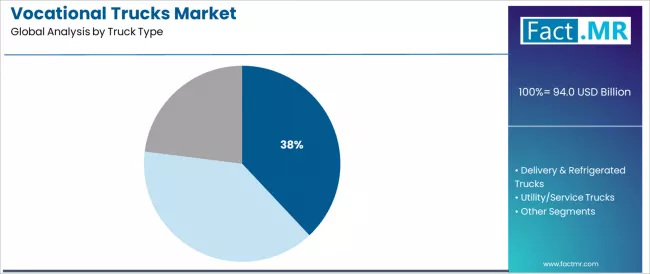
The concrete/mixer & tipper trucks type segment is projected to maintain its leading position in the vocational trucks market in 2025 with a 38.0% market share, reaffirming its role as the preferred vehicle category for construction applications and comprehensive infrastructure development.
Construction operators and contractors increasingly utilize concrete/mixer & tipper trucks for their superior load capacity capabilities, excellent operational versatility, and proven performance in handling construction materials while maintaining operational efficiency and productivity reliability. Concrete/mixer & tipper technology's proven effectiveness and construction versatility directly address commercial requirements for specialized material handling and reliable construction support across diverse construction applications and project environments.
This truck type segment forms the foundation of modern construction transportation, as it represents the vehicle category with the greatest contribution to construction operations and established performance record across multiple construction applications and infrastructure projects.
Commercial vehicle industry investments in advanced construction technologies continue to strengthen adoption among contractors and operators. With increasing demand for infrastructure development and construction efficiency, concrete/mixer & tipper trucks align with both operational objectives and project requirements, making them the central component of comprehensive construction transportation strategies.
By GVW, the Class 6-8 Vocational Segment Dominates Market Demand
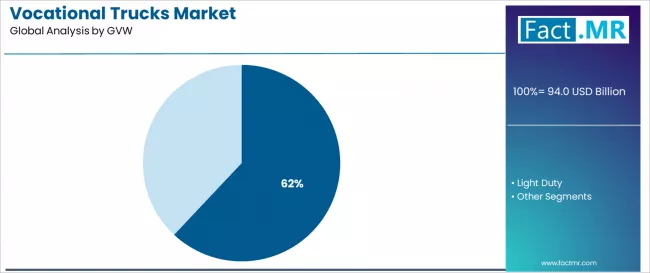
The Class 6-8 vocational GVW segment is projected to represent the largest share of vocational trucks demand in 2025 with a 62.0% market share, underscoring its critical role as the primary weight category for vocational truck adoption across heavy-duty applications, commercial operations, and specialized transportation tasks.
Fleet operators prefer Class 6-8 applications due to their exceptional capacity capabilities, comprehensive operational versatility, and ability to support demanding commercial requirements while maintaining performance standards and regulatory compliance objectives. Positioned as essential vehicles for modern commercial operations, Class 6-8 vocational trucks offer both operational advantages and economic benefits.
The segment is supported by continuous innovation in commercial vehicle technology and the growing availability of advanced heavy-duty systems that enable superior operational performance with enhanced capacity handling and improved operational coordination. Additionally, operators are investing in comprehensive Class 6-8 programs to support increasingly demanding operational standards and commercial requirements for effective and reliable heavy-duty transportation.
As commercial operations advance and capacity requirements increase, the Class 6-8 vocational segment will continue to dominate the market while supporting advanced vocational truck utilization and operational optimization strategies.
By Fuel Type, the Diesel Segment Commands Market Leadership
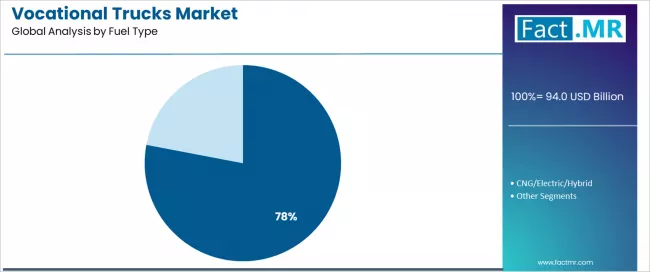
The diesel fuel type segment is projected to maintain the largest share of vocational trucks applications in 2025 with a 78.0% market share, highlighting its fundamental role in commercial vehicle operations, operational reliability, and fuel efficiency management.
Fleet operators prefer diesel applications for their comprehensive fuel availability, proven performance capabilities, and established effectiveness in supporting commercial transportation with superior range performance and consistent operational outcomes. This segment represents the backbone of vocational truck operations across multiple commercial applications and operational protocols.
The diesel segment benefits from ongoing technological advancement in engine technology and the expanding adoption of clean diesel solutions in commercial vehicle applications. Diesel demand continues to grow due to established fuel infrastructure, proven operational reliability requirements, and the need for fuel solutions that can support heavy-duty operations while maintaining operational efficiency and cost competitiveness.
As commercial operations remain focused on proven performance and infrastructure availability increases, the diesel fuel type segment will continue to drive market growth while supporting advanced vocational truck adoption and operational fuel optimization strategies.
What are the Drivers, Restraints, and Key Trends of the Vocational Trucks Market?
The vocational trucks market is advancing steadily due to increasing infrastructure development and construction activities driven by urbanization trends and government investment programs, growing adoption of specialized commercial vehicles that require advanced transportation solutions providing enhanced operational capabilities and task-specific performance across diverse construction projects, utility services, delivery operations, and commercial transportation facilities. However, the market faces challenges, including regulatory compliance costs and emission standards, economic cyclical dependencies and market volatility, and competition from alternative transportation solutions and equipment rental services. Innovation in electric vehicle integration and autonomous driving continues to influence product development and market expansion patterns.
Expansion of E-commerce and Last-Mile Delivery Services
The growing adoption of e-commerce platforms is driving demand for specialized delivery vehicles that address last-mile logistics requirements including package handling, route efficiency, and comprehensive delivery support in commercial and urban applications. E-commerce applications require advanced vocational trucks that deliver superior delivery capabilities across multiple operational parameters while maintaining cost-effectiveness and operational flexibility. Commercial operators are increasingly recognizing the competitive advantages of specialized delivery truck integration for logistics optimization and customer service excellence, creating opportunities for innovative commercial vehicles specifically designed for next-generation e-commerce delivery applications.
Integration of Electric and Alternative Fuel Technologies
Modern fleet operators are incorporating electric vehicle systems and alternative fuel technologies to enhance environmental performance, address sustainability requirements, and support comprehensive operational objectives through reduced emissions and intelligent fuel management. Leading companies are developing electric vocational platforms, implementing hybrid power systems, and advancing alternative fuel solutions that maximize operational effectiveness while supporting sustainable transportation approaches. These technologies improve environmental performance while enabling new market opportunities, including zero-emission applications, sustainable fleet integration, and advanced energy management.
Development of Autonomous Driving and Smart Vehicle Technologies
The expansion of autonomous driving capabilities, connected vehicle technologies, and intelligent transportation integration is driving demand for vocational trucks with enhanced connectivity characteristics and specialized autonomous capabilities. These advanced applications require specialized truck platforms with precise control systems and exceptional integration reliability that exceed traditional commercial vehicle requirements, creating premium market segments with differentiated technology propositions. Manufacturers are investing in autonomous capabilities and smart vehicle development to serve emerging intelligent transportation applications while supporting innovation in advanced commercial transportation and connected vehicle sectors.
Analysis of the Vocational Trucks Market by Key Countries
| Country | CAGR (2025-2035) |
|---|---|
| USA | 3.4% |
| Mexico | 3.1% |
| Germany | 2.8% |
| France | 2.7% |
| UK | 2.5% |
| South Korea | 2.4% |
| Japan | 2.3% |
The vocational trucks market is experiencing steady growth globally, with the USA leading at a 3.4% CAGR through 2035, driven by expanding construction activities and growing infrastructure investments, alongside increasing demand for specialized commercial vehicles and fleet modernization initiatives.
Mexico follows at 3.1%, supported by infrastructure development programs, growing commercial vehicle adoption, and increasing demand for vocational trucks in domestic and regional markets. Germany shows growth at 2.8%, emphasizing commercial vehicle innovation, transportation excellence, and advanced truck technology development.
France demonstrates 2.7% growth, supported by commercial transportation advancement and vehicle technology adoption. The UK records 2.5%, focusing on commercial vehicle innovation and transportation technology development. South Korea exhibits 2.4% growth, emphasizing commercial vehicle modernization and transportation applications. Japan shows 2.3% growth, emphasizing quality standards and specialized commercial vehicle applications.
USA Leads Global Market Growth with Construction Development and Infrastructure Investment
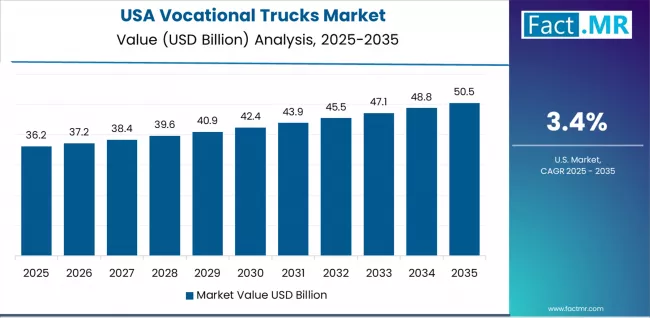
Revenue from vocational trucks in the USA is projected to exhibit strong growth with a CAGR of 3.4% through 2035, driven by expanding construction activities and rapidly growing infrastructure investment supported by government programs and advanced commercial vehicle adoption. The country's substantial construction industry and increasing investment in transportation infrastructure are creating substantial demand for vocational truck solutions. Major commercial vehicle manufacturers and fleet operators are establishing comprehensive vocational truck capabilities to serve both domestic markets and export opportunities.
- Strong construction expansion and growing infrastructure investment are driving demand for vocational trucks throughout major construction regions including Texas construction zones, California infrastructure projects, and construction development corridors, supporting both construction companies and fleet operators.
- Growing infrastructure development and commercial construction activities are supporting the rapid adoption of vocational truck technologies among operators seeking enhanced operational capabilities and construction efficiency in competitive commercial markets.
Mexico Demonstrates Commercial Integration with Transportation Infrastructure Development
Revenue from vocational trucks in Mexico is expanding at a CAGR of 3.1%, supported by infrastructure development initiatives, growing commercial transportation, and strategic position as a commercial hub for Latin American markets. Mexico's commercial development and transportation technology advancement are driving sophisticated vocational truck capabilities throughout commercial sectors. Leading commercial vehicle manufacturers and fleet operators are establishing extensive distribution facilities to address growing domestic commercial and regional market demand.
- Infrastructure development and expanding commercial transportation are creating opportunities for vocational truck adoption across construction facilities, fleet operations, and commercial centers in major commercial regions including Mexico City construction zones and commercial development areas.
- Growing commercial sector and transportation technology expansion are supporting the adoption of advanced commercial vehicles among operators seeking to serve both domestic and international markets while maintaining operational standards and commercial effectiveness.
Germany Demonstrates Commercial Excellence with Vehicle Innovation
Revenue from vocational trucks in Germany is expanding at a CAGR of 2.8%, driven by the country's commercial vehicle leadership, transportation innovation capabilities, and precision engineering excellence supporting high-performance vocational truck applications. Germany's commercial vehicle expertise and transportation innovation are driving demand for specialized vocational truck solutions throughout commercial sectors. Leading commercial vehicle manufacturers and transportation providers are establishing comprehensive innovation programs for next-generation commercial vehicle technologies.
- Advanced commercial vehicle development and transportation innovation requirements are creating demand for specialized vocational trucks among commercial operators and vehicle companies seeking enhanced operational performance and system reliability in competitive European markets.
- Strong commercial vehicle industry expertise and transportation technology leadership are supporting the adoption of advanced vocational truck technologies and operational optimization across commercial facilities throughout major transportation regions including Bavaria and North Rhine-Westphalia.
France Shows Commercial Excellence and Transportation Innovation Leadership
Revenue from vocational trucks in France is expanding at a CAGR of 2.7%, supported by the country's commercial transportation excellence, vehicle innovation leadership, and pioneering commercial advancement initiatives including sustainable transportation systems and advanced vehicle development. France's commercial heritage and transportation expertise are supporting investment in advanced vocational truck technologies. Major commercial vehicle manufacturers and transportation companies are establishing comprehensive commercial programs incorporating vocational truck advancement and operational innovation.
- Advanced commercial innovation and transportation technology capabilities are creating demand for premium vocational truck products supporting commercial excellence, transportation advancement, and operational optimization throughout major commercial and transportation technology regions.
- Strong commercial focus and transportation technology leadership are driving the adoption of advanced commercial vehicles and operational enhancement throughout transportation facilities across commercial excellence clusters and innovation zones.
UK Focuses on Commercial Innovation and Transportation Technology Development
Revenue from vocational trucks in the UK is growing at a CAGR of 2.5%, driven by the country's commercial innovation, transportation technology development initiatives, and emphasis on advanced commercial solutions for vehicle and transportation applications. The UK's commercial research excellence and transportation commitments are supporting investment in advanced vocational truck technologies. Major commercial vehicle manufacturers and transportation companies are establishing comprehensive commercial programs incorporating advanced vocational truck formulations.
- Commercial innovation and transportation development requirements are creating demand for high-performance vocational trucks supporting commercial advancement, transportation innovation, and operational optimization throughout major commercial and transportation technology regions.
- Strong research capabilities and commercial mandates are driving the adoption of advanced transportation technologies and operational enhancement supporting superior commercial performance and transportation leadership in competitive global markets.
South Korea Demonstrates Commercial Leadership with Transportation Technology Focus
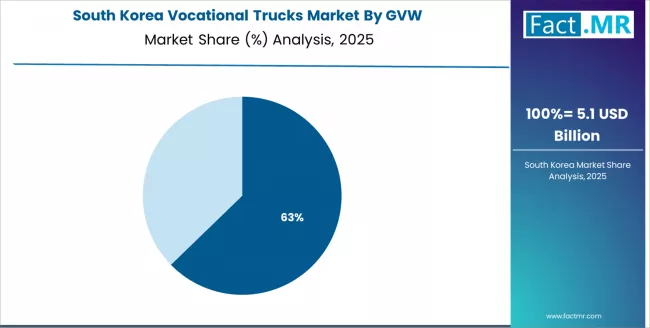
Revenue from vocational trucks in South Korea is expanding at a CAGR of 2.4%, supported by the country's commercial modernization, transportation technology expertise, and strong emphasis on advanced commercial solutions for comprehensive vehicle and transportation applications. South Korea's commercial sophistication and transportation innovation focus are driving sophisticated vocational truck capabilities throughout commercial sectors. Leading commercial vehicle manufacturers and transportation companies are investing extensively in advanced commercial technologies.
- Advanced commercial development and transportation technology innovation are creating demand for specialized vocational truck products throughout commercial applications, transportation systems, and vehicle facilities in major commercial regions including Seoul Capital Area and transportation innovation zones.
- Strong commercial industry and transportation expertise are supporting the adoption of innovative commercial technologies and operational optimization for next-generation applications requiring superior operational performance and commercial excellence.
Japan Shows Quality Excellence Focus with Specialized Commercial Vehicle Applications
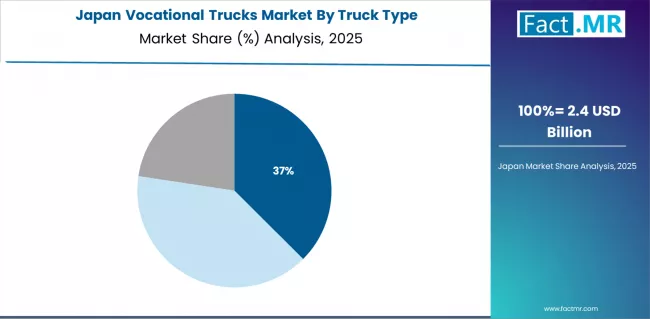
Revenue from vocational trucks in Japan is expanding at a CAGR of 2.3%, supported by the country's quality excellence standards, specialized commercial capabilities, and strong emphasis on high-specification commercial vehicles for advanced transportation and commercial sectors. Japan's quality sophistication and commercial excellence are driving demand for premium vocational truck products. Leading commercial vehicle manufacturers and transportation companies are investing in specialized capabilities for advanced commercial applications.
- Advanced commercial processing and quality manufacturing requirements are creating opportunities for high-quality vocational truck products throughout specialized commercial production, vehicle manufacturing, and transportation applications meeting stringent quality and performance standards.
- Strong commercial industry and transportation sector are driving adoption of specialized vocational truck devices and advanced commercial technologies supporting innovation in commercial care, transportation advancement, and vehicle sectors requiring superior operational performance and consistency.
Europe Market Split by Country
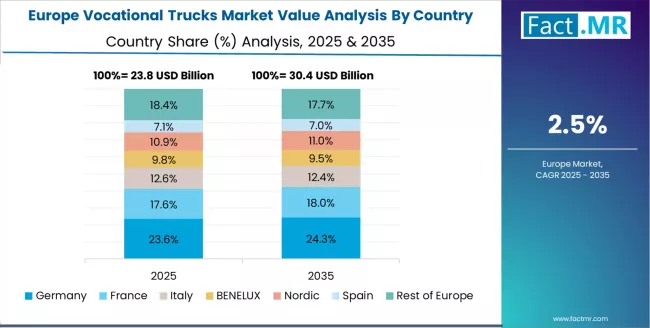
The vocational trucks market in Europe is projected to grow from USD 26.8 billion in 2025 to USD 34.1 billion by 2035, registering a CAGR of 2.7% over the forecast period. Germany is expected to maintain its leadership position with a 28.9% market share in 2025, declining slightly to 28.4% by 2035, supported by its advanced commercial vehicle manufacturing industry and strong transportation technology capabilities.
France follows with a 21.6% share in 2025, projected to reach 22.0% by 2035, driven by comprehensive commercial transportation development and vehicle manufacturing industry applications. The United Kingdom holds a 18.7% share in 2025, expected to decrease to 18.2% by 2035 due to market diversification. Italy commands a 15.2% share, while Spain accounts for 11.4% in 2025. The Rest of Europe region is anticipated to gain momentum, expanding its collective share from 4.2% to 4.7% by 2035, attributed to increasing commercial vehicle adoption in Nordic countries and emerging Eastern European transportation markets implementing advanced vocational truck programs.
Concrete/Mixer & Tipper Applications Dominate Construction Operations in Japan
The Japanese vocational trucks market demonstrates a mature and precision-focused landscape, characterized by advanced integration of construction vehicle technologies with existing transportation infrastructure across commercial facilities, construction networks, and operational systems. Japan's emphasis on quality excellence and operational precision drives demand for high-reliability vocational truck solutions that support comprehensive construction initiatives and regulatory requirements in commercial operations. The market benefits from strong partnerships between international vehicle providers like Daimler Trucks, Volvo Trucks, and domestic commercial leaders, including established transportation companies and construction specialists, creating comprehensive service ecosystems that prioritize vehicle quality and operational precision programs.
Class 6-8 Vocational Applications Lead Commercial Services in South Korea
The South Korean vocational trucks market is characterized by strong international commercial application presence, with companies like Paccar, Isuzu, and Hino maintaining dominant positions through comprehensive system integration and commercial services capabilities for transportation modernization and vehicle applications. The market is demonstrating a growing emphasis on localized commercial support and rapid deployment capabilities, as Korean commercial operators increasingly demand customized solutions that integrate with domestic transportation infrastructure and advanced vehicle systems deployed across major commercial centers and transportation facilities. Local commercial companies and regional vehicle integrators are gaining market share through strategic partnerships with global providers, offering specialized services including commercial training programs and certification services for transportation specialists.
Competitive Landscape of the Vocational Trucks Market
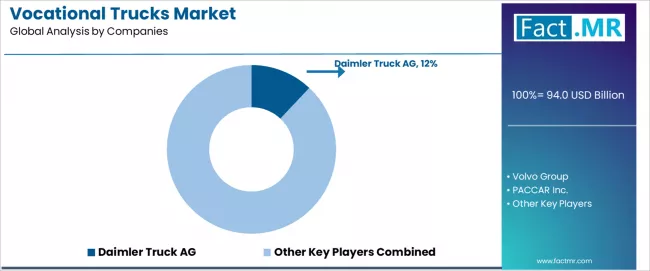
The vocational trucks market is characterized by competition among established commercial vehicle manufacturers, specialized truck producers, and diversified transportation technology companies. Companies are investing in advanced vehicle technology development, powertrain innovation, product portfolio expansion, and application-specific vehicle development to deliver high-performance, reliable, and cost-effective vocational truck solutions. Innovation in electric vehicle integration, autonomous driving capabilities, and operational optimization systems is central to strengthening market position and competitive advantage.
Daimler Trucks leads the market with a 12.0% share, offering comprehensive vocational truck solutions with a focus on commercial applications, advanced vehicle technologies, and integrated transportation platforms across diverse dealer and commercial distribution channels. The company has announced major technology advancement initiatives and investments in electric vehicle integration to support growing global demand for advanced commercial vehicles and sustainable transportation solutions. Volvo Trucks provides innovative commercial solutions with emphasis on operational excellence and sustainability technologies, while Paccar delivers specialized commercial vehicles with focus on performance applications and transportation efficiency. Isuzu offers comprehensive commercial solutions with vocational truck offerings for multiple transportation categories, and Hino provides advanced commercial technologies with emphasis on reliability systems and operational optimization. Navistar specializes in commercial vehicles with advanced truck technologies, while other key players including Mitsubishi Fuso, MAN, Scania, and Iveco contribute to market competition through specialized commercial capabilities and transportation vehicle expertise.
Vocational Trucks Market - Stakeholder Contribution Framework
Vocational trucks represent a specialized commercial vehicle segment within transportation and operational applications, projected to grow from USD 94.0 billion in 2025 to USD 126.0 billion by 2035 at a 3.0% CAGR. These commercial vehicles—primarily concrete/mixer & tipper trucks, delivery & refrigerated trucks, and utility/service trucks configurations for multiple applications—serve as critical transportation tools in construction operations, commercial fleets, utility services, and transportation facilities where operational efficiency, vehicle versatility, and commercial reliability are essential. Market expansion is driven by increasing infrastructure development, growing commercial vehicle advancement, expanding construction activities, and rising demand for advanced transportation solutions across diverse construction, commercial, utility, and transportation sectors.
How Transportation Regulators Could Strengthen Vehicle Standards and Commercial Safety?
- Commercial Vehicle Standards: Establish comprehensive technical specifications for vocational trucks, including safety requirements, performance standards, emission protocols, and operational guidelines that ensure consistent performance across construction operations, commercial fleets, utility services, and transportation facilities.
- Commercial Safety Integration: Develop regulatory frameworks that incentivize advanced commercial vehicle practices, requiring manufacturers to implement quality management systems, utilize safety validation protocols, incorporate operational efficiency procedures, and achieve measurable safety improvements in vocational truck development.
- Operational Efficiency Requirements: Implement mandatory performance standards for vocational truck manufacturing, including emission testing protocols, safety verification measures, and efficiency validation systems that ensure vehicle effectiveness and commercial safety across diverse transportation applications.
- Heavy-Duty Grade Guidelines: Create specialized regulations for heavy-duty vocational trucks used in commercial operations, addressing stringent safety specifications, performance requirements, and regulatory validation specific to transportation applications requiring enhanced reliability and operational protection.
- Innovation Support Programs: Provide regulatory facilitation and research incentives for development of next-generation commercial vehicle technologies that improve transportation sustainability, enhance vehicle performance, and enable emerging applications in electric vehicles and autonomous transportation systems.
How Industry Associations Could Advance Commercial Vehicle Standards and Market Development?
- Transportation Best Practices: Develop comprehensive technical guidelines for vocational truck selection, commercial optimization, and operational validation techniques that maximize transportation effectiveness, ensure commercial safety, and maintain cost-effectiveness across construction operations, commercial fleets, and transportation applications.
- Commercial Safety Benchmarking: Establish industry-wide metrics for transportation performance, including operational efficacy assessment, vehicle reliability measurement, commercial safety evaluation, and transportation application documentation that enable comparative analysis and drive continuous improvement toward operational optimization objectives.
- Professional Training Programs: Create specialized education initiatives for commercial operators, vehicle technicians, and transportation professionals covering vocational truck characteristics, commercial applications, safety requirements, and transportation techniques across diverse commercial applications.
- Vehicle Standardization: Develop standardized testing methodologies for vocational truck evaluation, including performance assessment, safety analysis, operational validation, and application-specific performance metrics that facilitate objective vehicle comparison and commercial validation.
- Commercial Collaboration: Facilitate partnerships between vocational truck suppliers, commercial operators, research institutions, and transportation organizations to advance commercial vehicle development, address emerging transportation challenges, and accelerate innovation in commercial transportation applications.
How Vocational Truck Manufacturers Could Drive Innovation and Market Leadership?
- Advanced Commercial Technologies: Invest in engine technology enhancement, operational efficiency optimization, vehicle system development, and commercial safety improvement initiatives that enhance transportation effectiveness while maintaining vehicle reliability and regulatory compliance in global markets.
- Specialized Vehicle Development: Develop specialized vocational trucks with enhanced commercial characteristics, including optimized payload capacity, improved fuel efficiency, increased operational versatility, and application-specific performance attributes for emerging transportation segments.
- Operational Control Integration: Implement intelligent commercial systems with real-time vehicle monitoring, predictive performance assessment, automated efficiency verification, and data analytics that optimize vehicle performance, ensure commercial reliability, and reduce operational complexity.
- Commercial Support Services: Establish comprehensive customer service capabilities providing transportation consultation, technical assistance, vehicle troubleshooting, and commercial expertise that strengthen customer relationships and enable successful transportation implementation.
- Global Commercial Excellence: Develop regional service networks, specialized transportation support management, reliable technical support systems, and responsive customer service that ensure consistent vehicle availability, maintain quality standards, and support customer commercial requirements worldwide.
How End-User Industries Could Optimize Transportation Performance and Commercial Success?
- Strategic Vehicle Selection: Conduct comprehensive assessments of commercial requirements, transportation needs, regulatory constraints, and operational considerations to optimize vocational truck selection and achieve desired transportation characteristics while managing total commercial costs and operational outcomes.
- Commercial System Optimization: Implement advanced transportation methodologies utilizing operational validation, performance evaluation, and systematic vehicle assessment to maximize vocational truck commercial benefits, minimize operational complexity, and optimize overall transportation effectiveness and commercial efficiency.
- Transportation Safety Management: Develop optimized commercial protocols, safety control procedures, and performance validation that ensure effective vocational truck utilization, maximize transportation benefits, and maintain consistent commercial performance throughout transportation operations.
- Quality Commercial Integration: Incorporate transportation best practices, commercial safety principles, and vehicle quality considerations into operational planning and commercial processes that support comprehensive transportation objectives and commercial excellence.
- Strategic Commercial Partnerships: Establish strategic partnerships with vocational truck suppliers for joint transportation programs, commercial optimization initiatives, and co-innovation projects that address specific transportation challenges and accelerate commercial vehicle commercialization.
How Research Institutions Could Enable Commercial Vehicle Advancement?
- Transportation Research Programs: Conduct fundamental investigations into vocational truck technology, commercial mechanisms, operational optimization, and transportation applications that advance commercial understanding and enable breakthrough innovations in transportation technology and commercial science.
- Commercial Vehicle Development: Develop novel transportation methods, including advanced powertrain techniques, operational efficiency approaches, and commercial enhancement technologies that improve transportation performance while maintaining commercial safety and cost effectiveness.
- Transportation Application Innovation: Investigate emerging applications for vocational trucks in autonomous transportation, smart logistics, sustainable operations, and specialized commercial applications that create new market opportunities and expand transportation potential.
- Vehicle Validation Services: Provide advanced transportation research services utilizing operational validation, vehicle testing, commercial assessment, and performance evaluation methodologies that enable detailed understanding of vocational truck properties and transportation applications.
- Transportation Technology Transfer: Facilitate technology commercialization through licensing agreements, startup incubation programs, transportation publications, and collaborative research projects that accelerate transportation vehicle innovation adoption and strengthen industry-academia partnerships.
How Investors and Financial Enablers Could Support Commercial Vehicle Market Growth?
- Transportation Infrastructure Investment: Provide capital for vocational truck manufacturing facility construction, production capacity expansion, and technology upgrade projects that address growing commercial demand while improving operational efficiency and vehicle performance.
- Vehicle Innovation Financing: Fund research and development of breakthrough vocational truck technologies, including advanced commercial methods, efficiency enhancement systems, and novel transportation applications that address current market limitations and create competitive advantages.
- Commercial Development Support: Finance transportation vehicle innovation initiatives, operational validation programs, regulatory development, and vehicle advancement that enhance commercial capabilities and position manufacturers for long-term market acceptance and growth.
- Transportation Market Expansion: Support strategic acquisitions, market entry initiatives, distribution network development, and commercial vehicle service capabilities that accelerate geographic expansion and strengthen competitive positions in high-growth transportation markets.
- Global Transportation Development: Provide financing and technical assistance for vocational truck facilities in developing economies, creating new commercial vehicle supply capabilities, supporting local transportation development, and expanding global market access for commercial solutions.
Key Players in the Vocational Trucks Market
- Daimler Truck AG
- Volvo Group
- PACCAR Inc.
- Isuzu Motors Ltd.
- Hino Motors, Ltd.
- Navistar International Corporation
- Mitsubishi Fuso Truck and Bus Corporation
- MAN SE
- Scania AB
- Iveco S.p.A.
Scope of the Report
| Items | Values |
|---|---|
| Quantitative Units (2025) | USD 94.0 Billion |
| Truck Type | Concrete/Mixer & Tipper Trucks, Delivery & Refrigerated Trucks, Utility/Service Trucks |
| GVW | Class 6-8 Vocational, Light Duty |
| Fuel Type | Diesel, CNG/Electric/Hybrid |
| Regions Covered | North America, Europe, Asia Pacific, Latin America, Middle East & Africa |
| Countries Covered | USA, Germany, France, UK, Japan, South Korea, Mexico, and 40+ countries |
| Key Companies Profiled | Daimler Trucks, Volvo Trucks, Paccar, Isuzu, Hino, Navistar |
| Additional Attributes | Dollar sales by truck type and GVW category, regional demand trends, competitive landscape, technological advancements in commercial vehicle production, transportation development, vehicle innovation, and commercial performance optimization |
Vocational Trucks Market by Segments
-
Truck Type :
- Concrete/Mixer & Tipper Trucks
- Delivery & Refrigerated Trucks
- Utility/Service Trucks
-
GVW :
- Class 6-8 Vocational
- Light Duty
-
Fuel Type :
- Diesel
- CNG/Electric/Hybrid
-
Region :
-
North America
- United States
- Canada
- Mexico
-
Europe
- Germany
- United Kingdom
- France
- Italy
- Spain
- Netherlands
- Nordic
- BENELUX
- Rest of Europe
-
Asia Pacific
- China
- Japan
- South Korea
- India
- Australia
- Rest of Asia Pacific
-
Latin America
- Brazil
- Argentina
- Chile
- Rest of Latin America
-
Middle East & Africa
- Kingdom of Saudi Arabia
- Other GCC Countries
- Turkey
- South Africa
- Other African Union
- Rest of Middle East & Africa
-
Table of Content
- Executive Summary
- Global Market Outlook
- Demand to side Trends
- Supply to side Trends
- Technology Roadmap Analysis
- Analysis and Recommendations
- Market Overview
- Market Coverage / Taxonomy
- Market Definition / Scope / Limitations
- Market Background
- Market Dynamics
- Drivers
- Restraints
- Opportunity
- Trends
- Scenario Forecast
- Demand in Optimistic Scenario
- Demand in Likely Scenario
- Demand in Conservative Scenario
- Opportunity Map Analysis
- Product Life Cycle Analysis
- Supply Chain Analysis
- Investment Feasibility Matrix
- Value Chain Analysis
- PESTLE and Porter’s Analysis
- Regulatory Landscape
- Regional Parent Market Outlook
- Production and Consumption Statistics
- Import and Export Statistics
- Market Dynamics
- Global Market Analysis 2020 to 2024 and Forecast, 2025 to 2035
- Historical Market Size Value (USD Million) Analysis, 2020 to 2024
- Current and Future Market Size Value (USD Million) Projections, 2025 to 2035
- Y to o to Y Growth Trend Analysis
- Absolute $ Opportunity Analysis
- Global Market Pricing Analysis 2020 to 2024 and Forecast 2025 to 2035
- Global Market Analysis 2020 to 2024 and Forecast 2025 to 2035, By Truck Type
- Introduction / Key Findings
- Historical Market Size Value (USD Million) Analysis By Truck Type , 2020 to 2024
- Current and Future Market Size Value (USD Million) Analysis and Forecast By Truck Type , 2025 to 2035
- Concrete/Mixer & Tipper Trucks
- Delivery & Refrigerated Trucks
- Utility/Service Trucks
- Y to o to Y Growth Trend Analysis By Truck Type , 2020 to 2024
- Absolute $ Opportunity Analysis By Truck Type , 2025 to 2035
- Global Market Analysis 2020 to 2024 and Forecast 2025 to 2035, By GVW
- Introduction / Key Findings
- Historical Market Size Value (USD Million) Analysis By GVW, 2020 to 2024
- Current and Future Market Size Value (USD Million) Analysis and Forecast By GVW, 2025 to 2035
- Class 6-8 Vocational
- Light Duty
- Y to o to Y Growth Trend Analysis By GVW, 2020 to 2024
- Absolute $ Opportunity Analysis By GVW, 2025 to 2035
- Global Market Analysis 2020 to 2024 and Forecast 2025 to 2035, By Fuel Type
- Introduction / Key Findings
- Historical Market Size Value (USD Million) Analysis By Fuel Type, 2020 to 2024
- Current and Future Market Size Value (USD Million) Analysis and Forecast By Fuel Type, 2025 to 2035
- Diesel
- CNG/Electric/Hybrid
- Y to o to Y Growth Trend Analysis By Fuel Type, 2020 to 2024
- Absolute $ Opportunity Analysis By Fuel Type, 2025 to 2035
- Global Market Analysis 2020 to 2024 and Forecast 2025 to 2035, By Region
- Introduction
- Historical Market Size Value (USD Million) Analysis By Region, 2020 to 2024
- Current Market Size Value (USD Million) Analysis and Forecast By Region, 2025 to 2035
- North America
- Latin America
- Western Europe
- Eastern Europe
- East Asia
- South Asia and Pacific
- Middle East & Africa
- Market Attractiveness Analysis By Region
- North America Market Analysis 2020 to 2024 and Forecast 2025 to 2035, By Country
- Historical Market Size Value (USD Million) Trend Analysis By Market Taxonomy, 2020 to 2024
- Market Size Value (USD Million) Forecast By Market Taxonomy, 2025 to 2035
- By Country
- USA
- Canada
- Mexico
- By Truck Type
- By GVW
- By Fuel Type
- By Country
- Market Attractiveness Analysis
- By Country
- By Truck Type
- By GVW
- By Fuel Type
- Key Takeaways
- Latin America Market Analysis 2020 to 2024 and Forecast 2025 to 2035, By Country
- Historical Market Size Value (USD Million) Trend Analysis By Market Taxonomy, 2020 to 2024
- Market Size Value (USD Million) Forecast By Market Taxonomy, 2025 to 2035
- By Country
- Brazil
- Chile
- Rest of Latin America
- By Truck Type
- By GVW
- By Fuel Type
- By Country
- Market Attractiveness Analysis
- By Country
- By Truck Type
- By GVW
- By Fuel Type
- Key Takeaways
- Western Europe Market Analysis 2020 to 2024 and Forecast 2025 to 2035, By Country
- Historical Market Size Value (USD Million) Trend Analysis By Market Taxonomy, 2020 to 2024
- Market Size Value (USD Million) Forecast By Market Taxonomy, 2025 to 2035
- By Country
- Germany
- UK
- Italy
- Spain
- France
- Nordic
- BENELUX
- Rest of Western Europe
- By Truck Type
- By GVW
- By Fuel Type
- By Country
- Market Attractiveness Analysis
- By Country
- By Truck Type
- By GVW
- By Fuel Type
- Key Takeaways
- Eastern Europe Market Analysis 2020 to 2024 and Forecast 2025 to 2035, By Country
- Historical Market Size Value (USD Million) Trend Analysis By Market Taxonomy, 2020 to 2024
- Market Size Value (USD Million) Forecast By Market Taxonomy, 2025 to 2035
- By Country
- Russia
- Poland
- Hungary
- Balkan & Baltic
- Rest of Eastern Europe
- By Truck Type
- By GVW
- By Fuel Type
- By Country
- Market Attractiveness Analysis
- By Country
- By Truck Type
- By GVW
- By Fuel Type
- Key Takeaways
- East Asia Market Analysis 2020 to 2024 and Forecast 2025 to 2035, By Country
- Historical Market Size Value (USD Million) Trend Analysis By Market Taxonomy, 2020 to 2024
- Market Size Value (USD Million) Forecast By Market Taxonomy, 2025 to 2035
- By Country
- China
- Japan
- South Korea
- By Truck Type
- By GVW
- By Fuel Type
- By Country
- Market Attractiveness Analysis
- By Country
- By Truck Type
- By GVW
- By Fuel Type
- Key Takeaways
- South Asia and Pacific Market Analysis 2020 to 2024 and Forecast 2025 to 2035, By Country
- Historical Market Size Value (USD Million) Trend Analysis By Market Taxonomy, 2020 to 2024
- Market Size Value (USD Million) Forecast By Market Taxonomy, 2025 to 2035
- By Country
- India
- ASEAN
- Australia & New Zealand
- Rest of South Asia and Pacific
- By Truck Type
- By GVW
- By Fuel Type
- By Country
- Market Attractiveness Analysis
- By Country
- By Truck Type
- By GVW
- By Fuel Type
- Key Takeaways
- Middle East & Africa Market Analysis 2020 to 2024 and Forecast 2025 to 2035, By Country
- Historical Market Size Value (USD Million) Trend Analysis By Market Taxonomy, 2020 to 2024
- Market Size Value (USD Million) Forecast By Market Taxonomy, 2025 to 2035
- By Country
- Kingdom of Saudi Arabia
- Other GCC Countries
- Turkiye
- South Africa
- Other African Union
- Rest of Middle East & Africa
- By Truck Type
- By GVW
- By Fuel Type
- By Country
- Market Attractiveness Analysis
- By Country
- By Truck Type
- By GVW
- By Fuel Type
- Key Takeaways
- Key Countries Market Analysis
- USA
- Pricing Analysis
- Market Share Analysis, 2024
- By Truck Type
- By GVW
- By Fuel Type
- Canada
- Pricing Analysis
- Market Share Analysis, 2024
- By Truck Type
- By GVW
- By Fuel Type
- Mexico
- Pricing Analysis
- Market Share Analysis, 2024
- By Truck Type
- By GVW
- By Fuel Type
- Brazil
- Pricing Analysis
- Market Share Analysis, 2024
- By Truck Type
- By GVW
- By Fuel Type
- Chile
- Pricing Analysis
- Market Share Analysis, 2024
- By Truck Type
- By GVW
- By Fuel Type
- Germany
- Pricing Analysis
- Market Share Analysis, 2024
- By Truck Type
- By GVW
- By Fuel Type
- UK
- Pricing Analysis
- Market Share Analysis, 2024
- By Truck Type
- By GVW
- By Fuel Type
- Italy
- Pricing Analysis
- Market Share Analysis, 2024
- By Truck Type
- By GVW
- By Fuel Type
- Spain
- Pricing Analysis
- Market Share Analysis, 2024
- By Truck Type
- By GVW
- By Fuel Type
- France
- Pricing Analysis
- Market Share Analysis, 2024
- By Truck Type
- By GVW
- By Fuel Type
- India
- Pricing Analysis
- Market Share Analysis, 2024
- By Truck Type
- By GVW
- By Fuel Type
- ASEAN
- Pricing Analysis
- Market Share Analysis, 2024
- By Truck Type
- By GVW
- By Fuel Type
- Australia & New Zealand
- Pricing Analysis
- Market Share Analysis, 2024
- By Truck Type
- By GVW
- By Fuel Type
- China
- Pricing Analysis
- Market Share Analysis, 2024
- By Truck Type
- By GVW
- By Fuel Type
- Japan
- Pricing Analysis
- Market Share Analysis, 2024
- By Truck Type
- By GVW
- By Fuel Type
- South Korea
- Pricing Analysis
- Market Share Analysis, 2024
- By Truck Type
- By GVW
- By Fuel Type
- Russia
- Pricing Analysis
- Market Share Analysis, 2024
- By Truck Type
- By GVW
- By Fuel Type
- Poland
- Pricing Analysis
- Market Share Analysis, 2024
- By Truck Type
- By GVW
- By Fuel Type
- Hungary
- Pricing Analysis
- Market Share Analysis, 2024
- By Truck Type
- By GVW
- By Fuel Type
- Kingdom of Saudi Arabia
- Pricing Analysis
- Market Share Analysis, 2024
- By Truck Type
- By GVW
- By Fuel Type
- Turkiye
- Pricing Analysis
- Market Share Analysis, 2024
- By Truck Type
- By GVW
- By Fuel Type
- South Africa
- Pricing Analysis
- Market Share Analysis, 2024
- By Truck Type
- By GVW
- By Fuel Type
- USA
- Market Structure Analysis
- Competition Dashboard
- Competition Benchmarking
- Market Share Analysis of Top Players
- By Regional
- By Truck Type
- By GVW
- By Fuel Type
- Competition Analysis
- Competition Deep Dive
- Daimler Truck AG
- Overview
- Product Portfolio
- Profitability by Market Segments (Product/Age /Sales Channel/Region)
- Sales Footprint
- Strategy Overview
- Marketing Strategy
- Product Strategy
- Channel Strategy
- Volvo Group
- PACCAR Inc.
- Isuzu Motors Ltd.
- Hino Motors, Ltd.
- Navistar International Corporation
- Mitsubishi Fuso Truck and Bus Corporation
- MAN SE
- Scania AB
- Iveco S.p.A.
- Daimler Truck AG
- Competition Deep Dive
- Assumptions & Acronyms Used
- Research Methodology
List Of Table
- Table 1: Global Market Value (USD Million) Forecast by Region, 2020 to 2035
- Table 2: Global Market Value (USD Million) Forecast by Truck Type , 2020 to 2035
- Table 3: Global Market Value (USD Million) Forecast by GVW, 2020 to 2035
- Table 4: Global Market Value (USD Million) Forecast by Fuel Type, 2020 to 2035
- Table 5: North America Market Value (USD Million) Forecast by Country, 2020 to 2035
- Table 6: North America Market Value (USD Million) Forecast by Truck Type , 2020 to 2035
- Table 7: North America Market Value (USD Million) Forecast by GVW, 2020 to 2035
- Table 8: North America Market Value (USD Million) Forecast by Fuel Type, 2020 to 2035
- Table 9: Latin America Market Value (USD Million) Forecast by Country, 2020 to 2035
- Table 10: Latin America Market Value (USD Million) Forecast by Truck Type , 2020 to 2035
- Table 11: Latin America Market Value (USD Million) Forecast by GVW, 2020 to 2035
- Table 12: Latin America Market Value (USD Million) Forecast by Fuel Type, 2020 to 2035
- Table 13: Western Europe Market Value (USD Million) Forecast by Country, 2020 to 2035
- Table 14: Western Europe Market Value (USD Million) Forecast by Truck Type , 2020 to 2035
- Table 15: Western Europe Market Value (USD Million) Forecast by GVW, 2020 to 2035
- Table 16: Western Europe Market Value (USD Million) Forecast by Fuel Type, 2020 to 2035
- Table 17: Eastern Europe Market Value (USD Million) Forecast by Country, 2020 to 2035
- Table 18: Eastern Europe Market Value (USD Million) Forecast by Truck Type , 2020 to 2035
- Table 19: Eastern Europe Market Value (USD Million) Forecast by GVW, 2020 to 2035
- Table 20: Eastern Europe Market Value (USD Million) Forecast by Fuel Type, 2020 to 2035
- Table 21: East Asia Market Value (USD Million) Forecast by Country, 2020 to 2035
- Table 22: East Asia Market Value (USD Million) Forecast by Truck Type , 2020 to 2035
- Table 23: East Asia Market Value (USD Million) Forecast by GVW, 2020 to 2035
- Table 24: East Asia Market Value (USD Million) Forecast by Fuel Type, 2020 to 2035
- Table 25: South Asia and Pacific Market Value (USD Million) Forecast by Country, 2020 to 2035
- Table 26: South Asia and Pacific Market Value (USD Million) Forecast by Truck Type , 2020 to 2035
- Table 27: South Asia and Pacific Market Value (USD Million) Forecast by GVW, 2020 to 2035
- Table 28: South Asia and Pacific Market Value (USD Million) Forecast by Fuel Type, 2020 to 2035
- Table 29: Middle East & Africa Market Value (USD Million) Forecast by Country, 2020 to 2035
- Table 30: Middle East & Africa Market Value (USD Million) Forecast by Truck Type , 2020 to 2035
- Table 31: Middle East & Africa Market Value (USD Million) Forecast by GVW, 2020 to 2035
- Table 32: Middle East & Africa Market Value (USD Million) Forecast by Fuel Type, 2020 to 2035
List Of Figures
- Figure 1: Global Market Pricing Analysis
- Figure 2: Global Market Value (USD Million) Forecast 2020-2035
- Figure 3: Global Market Value Share and BPS Analysis by Truck Type , 2025 and 2035
- Figure 4: Global Market Y to o to Y Growth Comparison by Truck Type , 2025-2035
- Figure 5: Global Market Attractiveness Analysis by Truck Type
- Figure 6: Global Market Value Share and BPS Analysis by GVW, 2025 and 2035
- Figure 7: Global Market Y to o to Y Growth Comparison by GVW, 2025-2035
- Figure 8: Global Market Attractiveness Analysis by GVW
- Figure 9: Global Market Value Share and BPS Analysis by Fuel Type, 2025 and 2035
- Figure 10: Global Market Y to o to Y Growth Comparison by Fuel Type, 2025-2035
- Figure 11: Global Market Attractiveness Analysis by Fuel Type
- Figure 12: Global Market Value (USD Million) Share and BPS Analysis by Region, 2025 and 2035
- Figure 13: Global Market Y to o to Y Growth Comparison by Region, 2025-2035
- Figure 14: Global Market Attractiveness Analysis by Region
- Figure 15: North America Market Incremental Dollar Opportunity, 2025-2035
- Figure 16: Latin America Market Incremental Dollar Opportunity, 2025-2035
- Figure 17: Western Europe Market Incremental Dollar Opportunity, 2025-2035
- Figure 18: Eastern Europe Market Incremental Dollar Opportunity, 2025-2035
- Figure 19: East Asia Market Incremental Dollar Opportunity, 2025-2035
- Figure 20: South Asia and Pacific Market Incremental Dollar Opportunity, 2025-2035
- Figure 21: Middle East & Africa Market Incremental Dollar Opportunity, 2025-2035
- Figure 22: North America Market Value Share and BPS Analysis by Country, 2025 and 2035
- Figure 23: North America Market Value Share and BPS Analysis by Truck Type , 2025 and 2035
- Figure 24: North America Market Y to o to Y Growth Comparison by Truck Type , 2025-2035
- Figure 25: North America Market Attractiveness Analysis by Truck Type
- Figure 26: North America Market Value Share and BPS Analysis by GVW, 2025 and 2035
- Figure 27: North America Market Y to o to Y Growth Comparison by GVW, 2025-2035
- Figure 28: North America Market Attractiveness Analysis by GVW
- Figure 29: North America Market Value Share and BPS Analysis by Fuel Type, 2025 and 2035
- Figure 30: North America Market Y to o to Y Growth Comparison by Fuel Type, 2025-2035
- Figure 31: North America Market Attractiveness Analysis by Fuel Type
- Figure 32: Latin America Market Value Share and BPS Analysis by Country, 2025 and 2035
- Figure 33: Latin America Market Value Share and BPS Analysis by Truck Type , 2025 and 2035
- Figure 34: Latin America Market Y to o to Y Growth Comparison by Truck Type , 2025-2035
- Figure 35: Latin America Market Attractiveness Analysis by Truck Type
- Figure 36: Latin America Market Value Share and BPS Analysis by GVW, 2025 and 2035
- Figure 37: Latin America Market Y to o to Y Growth Comparison by GVW, 2025-2035
- Figure 38: Latin America Market Attractiveness Analysis by GVW
- Figure 39: Latin America Market Value Share and BPS Analysis by Fuel Type, 2025 and 2035
- Figure 40: Latin America Market Y to o to Y Growth Comparison by Fuel Type, 2025-2035
- Figure 41: Latin America Market Attractiveness Analysis by Fuel Type
- Figure 42: Western Europe Market Value Share and BPS Analysis by Country, 2025 and 2035
- Figure 43: Western Europe Market Value Share and BPS Analysis by Truck Type , 2025 and 2035
- Figure 44: Western Europe Market Y to o to Y Growth Comparison by Truck Type , 2025-2035
- Figure 45: Western Europe Market Attractiveness Analysis by Truck Type
- Figure 46: Western Europe Market Value Share and BPS Analysis by GVW, 2025 and 2035
- Figure 47: Western Europe Market Y to o to Y Growth Comparison by GVW, 2025-2035
- Figure 48: Western Europe Market Attractiveness Analysis by GVW
- Figure 49: Western Europe Market Value Share and BPS Analysis by Fuel Type, 2025 and 2035
- Figure 50: Western Europe Market Y to o to Y Growth Comparison by Fuel Type, 2025-2035
- Figure 51: Western Europe Market Attractiveness Analysis by Fuel Type
- Figure 52: Eastern Europe Market Value Share and BPS Analysis by Country, 2025 and 2035
- Figure 53: Eastern Europe Market Value Share and BPS Analysis by Truck Type , 2025 and 2035
- Figure 54: Eastern Europe Market Y to o to Y Growth Comparison by Truck Type , 2025-2035
- Figure 55: Eastern Europe Market Attractiveness Analysis by Truck Type
- Figure 56: Eastern Europe Market Value Share and BPS Analysis by GVW, 2025 and 2035
- Figure 57: Eastern Europe Market Y to o to Y Growth Comparison by GVW, 2025-2035
- Figure 58: Eastern Europe Market Attractiveness Analysis by GVW
- Figure 59: Eastern Europe Market Value Share and BPS Analysis by Fuel Type, 2025 and 2035
- Figure 60: Eastern Europe Market Y to o to Y Growth Comparison by Fuel Type, 2025-2035
- Figure 61: Eastern Europe Market Attractiveness Analysis by Fuel Type
- Figure 62: East Asia Market Value Share and BPS Analysis by Country, 2025 and 2035
- Figure 63: East Asia Market Value Share and BPS Analysis by Truck Type , 2025 and 2035
- Figure 64: East Asia Market Y to o to Y Growth Comparison by Truck Type , 2025-2035
- Figure 65: East Asia Market Attractiveness Analysis by Truck Type
- Figure 66: East Asia Market Value Share and BPS Analysis by GVW, 2025 and 2035
- Figure 67: East Asia Market Y to o to Y Growth Comparison by GVW, 2025-2035
- Figure 68: East Asia Market Attractiveness Analysis by GVW
- Figure 69: East Asia Market Value Share and BPS Analysis by Fuel Type, 2025 and 2035
- Figure 70: East Asia Market Y to o to Y Growth Comparison by Fuel Type, 2025-2035
- Figure 71: East Asia Market Attractiveness Analysis by Fuel Type
- Figure 72: South Asia and Pacific Market Value Share and BPS Analysis by Country, 2025 and 2035
- Figure 73: South Asia and Pacific Market Value Share and BPS Analysis by Truck Type , 2025 and 2035
- Figure 74: South Asia and Pacific Market Y to o to Y Growth Comparison by Truck Type , 2025-2035
- Figure 75: South Asia and Pacific Market Attractiveness Analysis by Truck Type
- Figure 76: South Asia and Pacific Market Value Share and BPS Analysis by GVW, 2025 and 2035
- Figure 77: South Asia and Pacific Market Y to o to Y Growth Comparison by GVW, 2025-2035
- Figure 78: South Asia and Pacific Market Attractiveness Analysis by GVW
- Figure 79: South Asia and Pacific Market Value Share and BPS Analysis by Fuel Type, 2025 and 2035
- Figure 80: South Asia and Pacific Market Y to o to Y Growth Comparison by Fuel Type, 2025-2035
- Figure 81: South Asia and Pacific Market Attractiveness Analysis by Fuel Type
- Figure 82: Middle East & Africa Market Value Share and BPS Analysis by Country, 2025 and 2035
- Figure 83: Middle East & Africa Market Value Share and BPS Analysis by Truck Type , 2025 and 2035
- Figure 84: Middle East & Africa Market Y to o to Y Growth Comparison by Truck Type , 2025-2035
- Figure 85: Middle East & Africa Market Attractiveness Analysis by Truck Type
- Figure 86: Middle East & Africa Market Value Share and BPS Analysis by GVW, 2025 and 2035
- Figure 87: Middle East & Africa Market Y to o to Y Growth Comparison by GVW, 2025-2035
- Figure 88: Middle East & Africa Market Attractiveness Analysis by GVW
- Figure 89: Middle East & Africa Market Value Share and BPS Analysis by Fuel Type, 2025 and 2035
- Figure 90: Middle East & Africa Market Y to o to Y Growth Comparison by Fuel Type, 2025-2035
- Figure 91: Middle East & Africa Market Attractiveness Analysis by Fuel Type
- Figure 92: Global Market - Tier Structure Analysis
- Figure 93: Global Market - Company Share Analysis
- FAQs -
How big is the vocational trucks market in 2025?
The global vocational trucks market is estimated to be valued at USD 94.0 billion in 2025.
What will be the size of vocational trucks market in 2035?
The market size for the vocational trucks market is projected to reach USD 126.0 billion by 2035.
How much will be the vocational trucks market growth between 2025 and 2035?
The vocational trucks market is expected to grow at a 3.0% CAGR between 2025 and 2035.
What are the key product types in the vocational trucks market?
The key product types in vocational trucks market are concrete/mixer & tipper trucks, delivery & refrigerated trucks and utility/service trucks.
Which gvw segment to contribute significant share in the vocational trucks market in 2025?
In terms of gvw, class 6-8 vocational segment to command 62.0% share in the vocational trucks market in 2025.